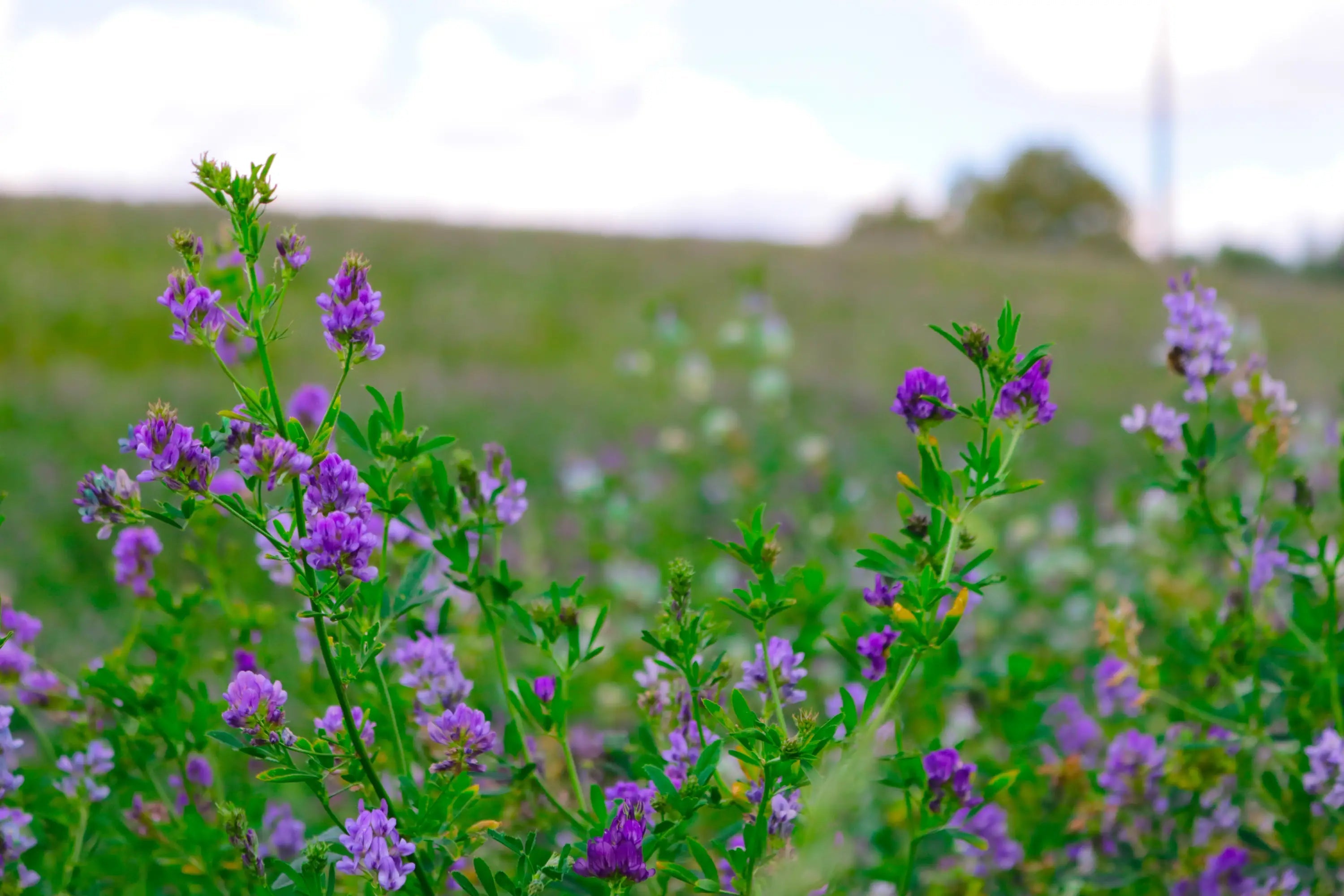Although alfalfa is commonly grown as a livestock feed, its high nutritional profile makes it considerable as a medicinal plant.Alfalfa benefits human health in many ways. Do you want to know how? Keep exploring with us till the end.
In this article, we’ll explore some of the most common benefits of alfalfa along with necessary precautions and possible side effects. But before we get into how alfalfa can benefit human health, it’s worth knowing the basics of this versatile herb a little bit more. So, let’s get started.
What is alfalfa?
Alfalfa, otherwise botanically known as Medicago sativa, is a perennial flowering herb from the legume family that has a long history of traditional use in alternative medicine for centuries. It is richer in plant vitamins, minerals, and protein than other veggies. It seems to have originated from Central and South Asia but now is grown throughout the world. Today, alfalfa is widely available in various supplementary forms including dried herb, powder, tablet, herbal teas, and tincture. Let’s take a look at its nutritional profile.
Alfalfa nutrition facts
Alfalfa is very low in calories but highly nutritious. It’s densely packed with plant nutrients, such as:
- Vitamin K
- Vitamin C
- Folate
- Iron
- Riboflavin
- Magnesium
- Manganese
- Copper
- Calcium
- Potassium
Alfalfa is also a rich source of bioactive plant compounds, including but not limited to:
- Saponins
- Flavonoids
- Phytoestrogens
- Folic acid
- Alkaloids
Benefits of alfalfa
Alfalfa and the nutrients it contains offer a range of health benefits.
Alfalfa may help in blood sugar control
Alfalfa has been shown to possess noticeable anti-diabetic and diuretic properties. It helps in slowing down the absorption of glucose in the gastrointestinal tract. As a result, it can help keep blood sugar levels in check.
A 2015 study showed that alfalfa sprouts have significant antihyperglycemic properties that can help lower high blood sugar levels.
Alfalfa may help lower cholesterol
Alfalfa contains significant amounts of biologically active plant compounds saponins. These compounds have the capacity to bind bile salts with serum cholesterol, making them highly beneficial for reducing cholesterol levels naturally.
In an old 1981 study in the Journal of Clinical Investigation, researchers found that alfalfa saponins possess the capacity to regulate cholesterol and bile acid balance.
Alfalfa may help lower inflammation
Alfalfa contains pectic polysaccharides, which have been found to have potent anti-inflammatory properties. This can hugely help with managing inflammation and its associated symptoms such as pain and swelling in various types of inflammatory joint conditions.
A 2015 study in the Journal of Agricultural and Food Chemistry showed that pectic polysaccharides isolated from alfalfa stems possess significant anti-inflammatory actions.
Alfalfa may help prevent cellular damage
Alfalfa has been found to have tremendous antioxidant properties that can help prevent damage caused by damaging particles called free radicals. Free radicals are unstable oxygen-containing molecules that cause large chain reactions and damage cells, tissues, and even organs. By neutralizing free radicals alfalfa can help reduce the risk of many chronic conditions, especially those that are related to the heart, central nervous system (CNS), and metabolism.
Alfalfa may help in managing menopause symptoms
Alfalfa contains phytoestrogens. Phytoestrogens are plant compounds that can mimic the actions of estrogen hormone. Research suggests that these phytoestrogens can help alleviate various symptoms of menopause including hot flashes, nocturnal sweats, and vaginal dryness.
A 1998 clinical trial in Minerva Ginecologica investigating the phytotherapeutic agents on menopausal symptoms found that alfalfa has the capacity to control various menopausal symptoms, particularly hot flushes and night sweating.
How to use alfalfa
Alfalfa is available in various forms including dried herbs, capsules, tablets, herbal teas, and tinctures. Dosages and methods of use depend on personal health status and aims of use.
For tincture, a dosage of 30 drops is most often recommended by clinicians which can be taken with water or juices 2 to 3 times a day. Consider working with a professional natural medicine expert to determine what dosage and method of use would be the best for your specific health condition.
Here you can see our pure and natural Alfalfa Tincture.
Side effects and precautions
Alfalfa is possibly safe for most people when taken in moderation. Some people may experience gastrointestinal discomfort with gas, abdominal pain, and diarrhea.
Besides, alfalfa has an influence on blood clotting. Therefore, those who are on blood-thinning medications should avoid it. People with weak immune responses or those with autoimmune conditions should consult their healthcare provider prior to using it. It’s best to consult with a certified naturopathic doctor before using alfalfa, especially if you’re pregnant or on medications.
Final words
Alfalfa is a medicinal herb with many potential benefits. It may help regulate blood sugar levels, lower cholesterol levels, reduce inflammation, and relieve symptoms of menopause. Pregnant and those who are on blood-thinning medications should avoid it. Consider working with a certified natural medicine expert prior to using it.





Share:
Mugwort Herb: Everything You Need to Know
Mullein Leaf for Lungs: A Natural Remedy for Respiratory Issues